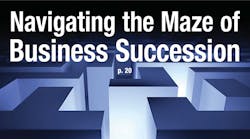Navigating the Maze of Business Succession, Part 2: Distributors Can Support Contractors During HVAC Succession Planning
One of the last business decisions HVAC contractors face is also one of the biggest.
Creating an effective succession strategy requires unique discipline, focus, and fortitude. It’s easy to understand why many business owners put succession planning off as long as possible. It’s complicated, time-consuming, and touches on sensitive topics such as family, money, and leadership.
Succession planning starts with an honest business evaluation and involves answering hard questions:
- Can you afford to exit?
- Is your business in solid financial shape?
- If not, what will it take to get there?
- Who will lead the company after you exit?
- Who are all the stakeholders in the company, and what do you owe them?
- What are the tax and other financial implications of your exit?
- Is there a contingency plan?
Most HVAC distributors aren’t experts in succession planning for residential and commercial service contractors. So how can you help your customers prepare for this significant step?
It’s simple: Make life easier for them.
You don’t have to develop a succession strategy for your customers or introduce them to your financial planner. But every resource orservice you share helps save time or effort and reduces day-to-day challenges inherent to running a contracting business. Doing this ensures they have more time to focus on a strategy to pass their company on to the next generation.
Anticipate what your customers need and connect them with solutions. That’s a good business strategy for any company, regardless of the industry. For HVAC distributors, it can be a critical way to build trusting, long-lasting relationships.
Here are some proactive steps HVAC distributors can take to help their contractor customers thrive in the succession planning process.
Build the Best Training Network in Your Service Area
The less time business owners must spend on training team members, the more time they have to take care of the financial and legal intricacies of their succession plan. Help your customers by offering comprehensive training support that frees them from the responsibility of coordinating or monitoring ongoing learning sessions.
Connect customers with manufacturers who provide product training on maintenance, repair, and installations. Encourage manufacturers you work with to arrange training opportunities for the HVAC professionals in your area. Work with professional organizations and vocational schools to develop new opportunities. Distributors can even consider implementing training programs to meet the ongoing needs of contractors and their teams.
Be a Resource for Regulations
Contractors, as a rule, keep up with the latest local, state, and national regulations that apply to their industry. In recent years, the pace and scale of regulatory change have accelerated. It’s hard for one person to navigate the increasingly complex network of rules and regulations in any given service area.
PART 1: Mergers and acquisitions explained
You don’t have to know everything about your area’s codes and permits, licensing requirements, environmental standards, safety rules, or other regulations. You should know where to find that information quickly and understand how it affects your customers. Keep yourself in a position to answer any of their questions or to point them in the direction of experts who can help. Be sure to include the latest news updates in your email marketing campaigns.
Serve as a Savings Clearinghouse
You have access to some of the most reliable and up-to-date information on rebates, and other savings opportunities contractors can apply to their purchases or offer customers.
Connect Customers with Professional Services and InformationDistributors must be prepared to guide contractors to helpful, professional services they may not be aware of, such as accounting, marketing, or dispatching services and software. These tasks can eat into the productivity and profitability of HVAC businesses and small business owners.
Help customers understand these time-consuming tasks can be automated or streamlined, freeing up time for succession planning. You can also cultivate relationships with representatives from local chapters of professional organizations who can clue you and your customers into all available resources.
Don’t try to do more than you’re capable of doing. Leveraging expertise, relationships and other available resources is a great way to demonstrate your commitment to your customers. Building trust over time may not solve their most complicated succession issues, but it can help them find the time and energy to address planning challenges.
Candy Cunningham is the Distributor Relationship Specialist & Trainer for Business Development Resources (BDR), the premier provider of business training and coaching to the home service industry. Candy has over three decades of experience in HVAC, with roles in distribution sales and territory management. Learn more about BDR at www.bdrco.com.



![Oatey Davenport Associates[1] Oatey Davenport Associates[1]](https://img.contractingbusiness.com/files/base/ebm/contractingbusiness/image/2023/05/Oatey_Davenport_Associates_1_.645e59c001ea9.png?auto=format,compress&fit=fill&pad=5&fill-color=white&q=45&h=139&height=139&w=250&width=250)







